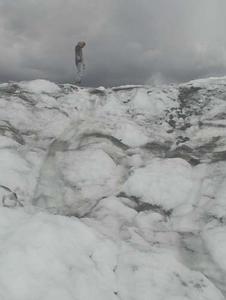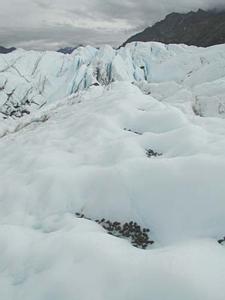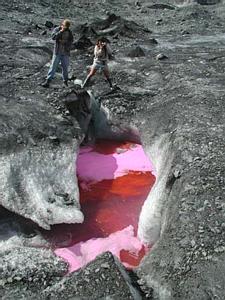6 August, 2000
August 6 , 2000
Matanuska Glacier, Alaska
Things have seemed awful slow lately as weíve had to wait for some dye
to get here. In a way that has been really nice because it has allowed
me the time to watch Bob Biglís drilling as well as the free time to
just hike around. Something that I forgot to mention yesterday in
relation to the drilling was the depth of the holes that were bored.
Since these holes were bored really close to the stream that drains the
glacier I was shocked to find that the ice in this area is 17 to 20
meters thick. What is so surprising to me is that it must extend to
depths well below the bottom of the stream itself. I just find it odd
that a bed of gravel and sediment at the bottom of the stream is
probably resting on ice near the terminus.
The water that comes rushing out of the vents, and now these holes,
comes to the surface like an Artesian well. One of the holes yesterday
was bored on a ridge of ice and the water coming out of it has produced
the first glacier waterfall that Iíve seen here. The surface melt water
does not run into resistant ice to produce waterfalls. Unlike
differences between soft and hard rock, ice is going to melt (or erode)
away at the same rate preventing waterfalls from forming. The only place
where water actually drops a significant distance is at the moulins. But
even there a significant drop only lasts a few days before melting
channels make the drops much more shallow.
I had a really nice hike high up on the white ice again yesterday. With
just a few days before itís time to leave I have felt this urge to get
up there again to explore new areas. Once again I had a wonderful time
peeking into huge crevasses and hiking the ridge lines. I was very
surprised to find some moose droppings on one of the highest ridges. I
canít figure out why a moose would venture up there much less how they
manage to get there without crampons! It would certainly be an odd
encounter to hike over an ice ridge and come across a moose.
We finally got our hands on some dye around mid-day today and we wasted
no time getting back to work with another dye test. Weíve changed plans
and decided to see what effect the unusual water levels in the moulins
would have on our original results. We are sampling from M-1 and Mega
Vent once again and adding our dye to the same moulin as in previous
tests. We retrieved the samples from the ISCOs earlier this evening and
will have a look at the samples tomorrow.
Marvin Giesting

Ben Burnett looks into the bore hole as the gray discharge cascades down the sloping ice ridge on the left.

Who would ever expect to see a moose up here?

Ben Burnett and Staci Ensminger join me in taking pictures of the dye-filled moulin.
Contact the TEA in the field at
.
If you cannot connect through your browser, copy the
TEA's e-mail address in the "To:" line of
your favorite e-mail package.
|
